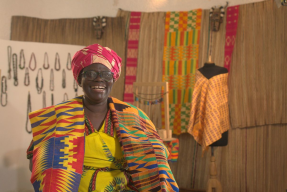A United Africa Part Two: Why is my internet so slow, why are my phone calls so expensive and what can be done about it to unite Africa, enhance Kiva, and speed development?
July 7, 2012In my last blog post, I discussed the geopolitical barriers to a united Africa-namely its size. However, sheer size is not the only impediment to African unity. I came across another issue when I attempted to call my friend Emily in Niger on my MTN (South African telecom company) cell phone. Since I arrived in Ghana I have been both impressed and thankful for the low cost of calling friends and family in The United States. For $5 worth of phone credit I can spend about three hours on the phone to the US. That works out to 3 cents a minute (compared to 29 cents a minute via Skype). This low price had me thinking that everything I had heard about the African-cell-phone-panacea was true. So, when my friend Emily said it was expensive for her to call out of Niger, I offered to call her instead. This time I ran through $5 in 20 minutes–a whopping 40 cents a minute!
How could this be? How could calling my friend 571 miles away be 13 times more expensive than calling my family 5,273 miles away? The answer lies in infrastructure. I know, I know, development-advocates sometimes sound like a broken record when it comes to the topic of infrastructure, but humor me a little and I promise you will come away with a better understanding of the “series of tubes” (ala Alaskan Senator Ted Stevens) we call the internet.
As it turns out, inter-continental internet and phone communications operate across fiber-optic cables that run along the floor of the ocean. Transmitting this information overland requires either burying fiber-optic cables (they would be ruined by weather and human traffic if placed aboveground) or installing radio towers (which have a much smaller capacity and range). This is why it is cheaper to call the US than Niger, because the road to Niger is long and the placement of underwater fiber-optic cables between Accra and New York is (relatively) cheap.
Yet, with the availability of fiber-optic cables that land right here in Accra, why is the internet still so much slower here? Well, according to the submarine cable map (see image below) provided by TeleGeography, there are only five cables making port in Ghana, compared to 43 landings on the Eastern Seaboard of the United States alone. These cables are typically laid by partnerships among telecom companies (some nationalized, some private). Despite the huge returns to increased communication (if you build it, they will come), it can be difficult for African companies to front the sums of money required to lay fiber-optic cables—for example, the Unity Cable linking Japan and the US was completed to the tune of $300 million in 2010.
This morning BBC radio told me that only 10% of Africans have internet connectivity. They suggested that this demonstrated the business opportunity of expanded connections. I would agree that the potential is there (African mobile phone subscriptions went up by 35% in 2008 alone), but who can afford the startup cost of laying more fiber-optic cables? One thing is for certain: without a serious investment in infrastructure (both undersea and across land) and increased incomes continent-wide, the future of fast internet connections in Africa is bleak. Even bleaker would be the future of African unity, for how can Africa unite if its people cannot communicate? Even still bleaker is the potential for Kiva to united African lenders with African borrowers.
I look forward to a world where alliance and unity are the norm, where Africans can log onto Kiva and lend to their neighbors. Let us hope that the speed of technological advances will surprise us again by decreasing the cost of undersea fiber-optics and advancing the capability of overland connections. Let us also hope that increased connectivity will expand the reach of Kiva throughout the continent, allowing our Microfinance partners and Kiva fellows to work more efficiently and enabling Africans to better loan to each other. Maybe then a stronger, more durable African unity can be achieved.
PREVIOUS ARTICLE
Social Performance in Action: A behind-the-scenes look at one Field Partners' badges →NEXT ARTICLE
Spotlight on Europe’s most mysterious country →














